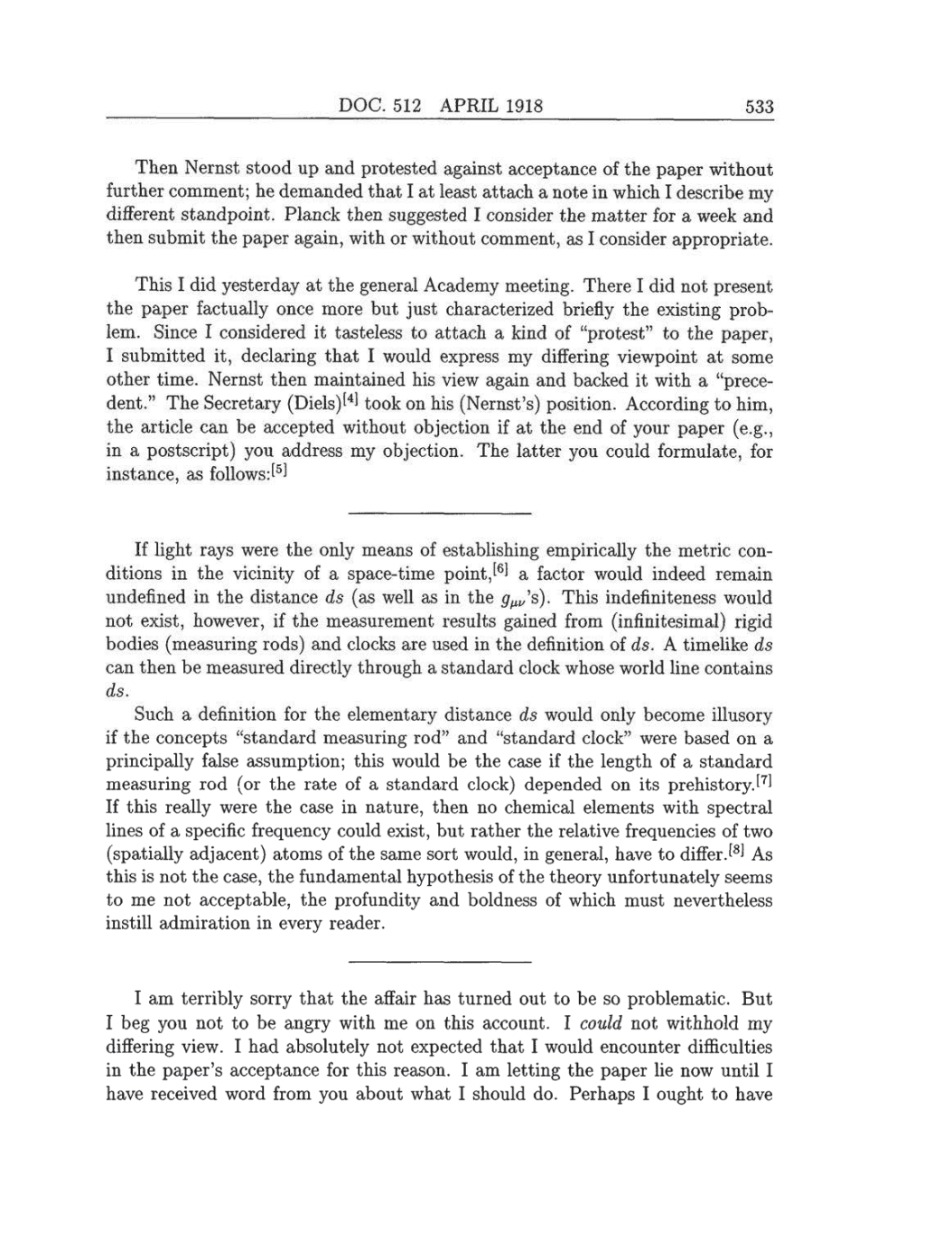DOC.
512
APRIL
1918
533
Then
Nernst
stood
up
and
protested
against acceptance
of
the
paper
without
further
comment;
he demanded
that
I at least
attach
a
note
in which
I
describe
my
different
standpoint.
Planck
then
suggested
I consider
the
matter
for
a
week
and
then submit
the
paper again,
with
or
without
comment,
as
I
consider
appropriate.
This
I
did
yesterday
at
the
general Academy meeting.
There
I
did not
present
the
paper factually
once more
but
just
characterized
briefly
the
existing prob-
lem. Since
I
considered it tasteless to
attach
a
kind
of
“protest”
to
the
paper,
I
submitted
it,
declaring
that
I
would
express my differing viewpoint
at
some
other
time. Nernst
then
maintained his view
again
and backed
it
with
a
“prece-
dent.” The
Secretary
(Diels)[4]
took
on
his
(Nernst’s) position. According
to
him,
the
article
can
be
accepted
without
objection
if
at
the
end of
your paper
(e.g.,
in
a
postscript) you
address
my
objection.
The
latter
you
could
formulate,
for
instance,
as
follows:[5]
If
light rays
were
the
only
means
of
establishing empirically
the
metric
con-
ditions in
the
vicinity
of
a
space-time
point,[6]
a
factor would indeed remain
undefined in
the
distance ds
(as
well
as
in
the
guv's).
This
indefiniteness would
not
exist, however,
if
the
measurement results
gained
from
(infinitesimal) rigid
bodies
(measuring rods)
and
clocks
are
used in
the
definition of ds.
A
timelike ds
can
then
be measured
directly
through
a
standard
clock
whose world line contains
ds.
Such
a
definition for
the
elementary
distance ds would
only
become
illusory
if
the
concepts
“standard
measuring
rod”
and “standard
clock”
were
based
on a
principally
false
assumption;
this
would be
the
case
if
the
length
of
a
standard
measuring
rod
(or
the
rate of
a
standard
clock)
depended
on
its
prehistory.[7]
If
this
really
were
the
case
in
nature,
then
no
chemical elements with
spectral
lines of
a
specific frequency
could
exist,
but rather
the relative
frequencies
of
two
(spatially
adjacent)
atoms of the
same
sort
would,
in
general,
have
to differ.[8]
As
this
is not
the
case,
the
fundamental
hypothesis
of
the
theory unfortunately
seems
to
me
not
acceptable,
the
profundity
and boldness
of
which must nevertheless
instill
admiration
in
every
reader.
I
am
terribly
sorry
that the
affair
has
turned
out to be
so
problematic.
But
I
beg you
not to be
angry
with
me on
this account.
I
could not withhold
my
differing
view. I
had
absolutely
not
expected
that
I
would encounter difficulties
in
the
paper’s acceptance
for
this
reason.
I
am
letting
the
paper
lie
now
until
I
have received word from
you
about
what
I
should
do.
Perhaps
I
ought
to
have
